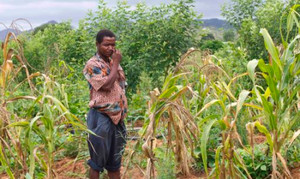Erratic Rainfall May Cause Poverty and Sickness in Kasupe Area
 In Zambia, maize is by far the most important crop grown by many small-scale farmers for food and income. Small-scale farmers produce the bulk of maize for family consumption, and sell some of the harvest as an income reserves. Any production slumps by small-scale farmers have telling effects on the national food security and the economy. It means also loss of livestock and the reduced income means that the farmer and his family cannot access proper medical care and education.
In Zambia, maize is by far the most important crop grown by many small-scale farmers for food and income. Small-scale farmers produce the bulk of maize for family consumption, and sell some of the harvest as an income reserves. Any production slumps by small-scale farmers have telling effects on the national food security and the economy. It means also loss of livestock and the reduced income means that the farmer and his family cannot access proper medical care and education.
The small-scale farmers in Zambia are vulnerable to climate change. Their production systems are wholly based on natural resources and rainfall. Water management that could help when there is no rainfall, is almost nonexistent, dams and deep wells for irrigation are far beyond their possibilities.
The planting season in Zambia usually begins with the rains, at the middle of November. This season erratic rainfall has delayed planting of maize, raising the possibility of a poor harvest after several bumper seasons. Rainfall has not been so good more especially in the month of January.
Most farmers in the area around Mthunzi - Kasupe and Tubalange – had high expectations but this year unfortunately they could be let down by not enough rainfall.
One of our neighbors, Mr. Kelvin Thomas, who has planted a lot of tomatoes as a cash crop, complains that “I am forced to use water from the sewage to water my crops and yet this water is too acid and tomatoes do not do well. But I have no option. With this tomatoes I will pay the school fees of my children!”. His maize crops is not doing well either, and it is attacked by different pest.
When it rains the water goes into culverts, and it is commonly used not only water their crops but also for domestic use, for washing clothes, pots and pans, and children bathe in it. There so the water becomes not only rich in chemicals and not god for the vegetable, but it can spread typhoid and cholera. From being a source of life water becomes a cause of sickness and death.
By Mike Mwenda


